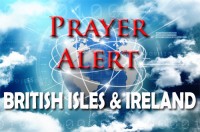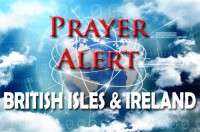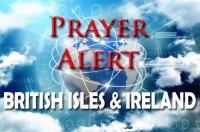Australia: palliative care
The Victorian government has conducted a public consultation to improve palliative care service and work towards the development of an end-of-life care framework. The Australian Christian Lobby was able to contribute to the discussion by making a submission that highlighted the importance of ensuring that good health practice is carried out in palliative care. People requiring medical treatment and care who are approaching the end of their life are often some of the most vulnerable members of society, and need to be treated in a way that is consistent with the dignity of their humanity. This means that public health policy must always reject any health care solutions that intentionally seek to end a patient’s life, even when desired by the patient.
South Africa: human trafficking
Nomasonto Khoza, the mother of a one-year-old toddler, and her two accomplices appeared at the Nelspruit magistrates’ court on Thursday, charged with human trafficking. The 25-year-old mother sold the child for R5,000 in Springs to 45-year-old Thobile Ndhlovu. The accused remain in custody until bail is paid. The case has been postponed to 17 February. Human trafficking affects countless victims around the world. The methodologies used to arrive at estimates about its nature and extent have been criticised as flawed or lacking in scientific rigour. In South Africa, claims by anti-trafficking campaigners and NGOs report that 30,000 children are trafficked into the country annually as part of the sex trade. The same figure has been used by the Department of Home Affairs to justify visa regulations aimed at combating child trafficking. The number of cases being reported suggests it is on the increase in South Africa. See also: http://theconversation.com/human-trafficking-in-south-africa-an-elusive-statistical-nightmare-43949
Nigeria: Boko Haram kill 80+ but President says ‘war against terror won’
Boko Haram slaughtered more than eighty people in a series of attacks the week after President Buhari suggested his army had ‘technically won the war.’ The Global Terror Report 2015 places Nigeria third on their list of 124 countries, and says that Boko Haram are ‘deadlier than IS, having killed more people’. Buhari had previously vowed to drive out the terror group from the country by December. He now suggests they have ‘technically’ been defeated as they revert to using improvised explosive devices and indoctrinating children. Meanwhile a refugee camp with 2,500 temporary homes for refugees fleeing Boko Haram now hosts close to one million. 2.5 million people have been internally displaced due to Boko Haram's various attacks. Reports suggest that women have been forced to carry out suicide bombings for the terrorists, who have become notorious for kidnapping thousands of women and girls from towns and villages.
Middle East: Iraq to mediate between Saudi Arabia and Iran?
Iraq dispatched its foreign minister to Tehran on Wednesday with an offer to mediate in an escalating feud between Saudi Arabia and Iran after Sunni Saudi Arabia executed Shi'ite Nimr al-Nimr because he complained that Shi'ites were marginalised and called for the overthrow of the Saudi royal family. Nimr’s execution infuriated Iran, the region's main Shi'ite Muslim power and inflamed sectarian anger to rise higher across the Middle East. Demonstrators sacked the Saudi embassy in Iran, and Shi’ite countries cut off diplomatic ties with Iran. Sunni-led Saudi Arabia and Shi'ite-led Iran have been fighting proxy wars in the region for generations. The Saudis have led a coalition of Shi'ite Houthi rebels in Yemen, resulting in devastation and starvation (see above). Shi'ite Iran backs Syria's President Assad against the Sunni rebels in that country's five-year civil war. Saudi Arabia is number 12, and Iran number 7 on the World Watch List of the worst persecutors of Christians.
Yemen: Fighting causing a humanitarian disaster
Homes are without power, food supplies cannot enter the area, and medical facilities have been bombed or closed. Since November heavy fighting in the central Yemeni city of Taiz has forced more than 30 hospitals and medical facilities to close. Doctors face an acute shortage of supplies, and the humanitarian situation worsens daily. The UN World Food Programme appealed to all parties in the conflict to allow food in for hundreds of thousands of hungry people under siege and deprived of supplies for many weeks. 22 governorates are experiencing food insecurity at ‘emergency’ level (one step below famine on the five-point Integrated Food Security Phase Classification scale), in a country where factional fighting in 2015 killed or wounded thousands of people and displaced 2.5 million others. Pray for the 7.6 million Yemenis who do not have enough food to lead a healthy life, have lost livelihoods, and face acute life-threatening malnutrition. See also: http://www.bbc.co.uk/news/world-middle-east-35236572
Worldwide weather
In Paraguay, Argentina, Uruguay, Brazil and Bolivia more than 160,000 people were displaced over the last few days of December by the heaviest floods to hit South America in 50 years. The year 2015 was the warmest on record globally. In the media, a lot of attention has been given to the many floods, droughts, wildfires and heatwaves that have battered countries this year. Little attention is given to the Arctic - where global warming is felt most strongly. Temperatures at the North Pole rose to above freezing point at the end of 2015; that’s more than 30 degrees higher than average. Last month 150 world leaders met at the COP21 climate summit and shook hands on the Paris Agreement. We can continue to pray through this year that countries will implement comprehensive and effective remedies to climate change. See also article 1 in the British Isles section, and go to http://arctic-news.blogspot.co.uk/
INSIGHT: Elections in Taiwan and elsewhere
Taiwan’s general elections will be held on 16 January to elect the 14th president and vice president and all 113 seats of the 9th Legislative Yuan. These elections are said to be the most important in the democracy in nearly 20 years because: 1. Taiwan is poised to elect its first female president, as both of the two major parties have nominated female presidential candidates. 2. Taiwan’s long-time ruling party, the KMT, is expected to lose the presidency and possibly the legislature. Taiwan operates a semi-presidential system, with a directly elected president but also a premier similar to parliamentary systems. 3. Taiwanese identity is growing despite (or because of) increased ties with China. Taiwan’s polls have frequently asked whether people identify as Chinese; over the years Chinese identification has fallen from 25.5 percent to 3.3 percent. This shift benefits the opposition party, the DPP, who have traditionally promoted a distinct Taiwanese identity. For information regarding other nation-changing elections in the coming year go to: http://www.prayer-alert.net/index.php?option=com_docman&view=download&alias=616-insight-elections-jan-june-2016&category_slug=insight-articles-1&Itemid=216
MPs to debate ban on Donald Trump entering UK
MPs will hold a debate on a petition calling for US Republican presidential candidate Donald Trump to be barred from Britain after his proposal to stop all Muslims entering the United States. The debate, called by the Petitions Committee of the lower house of parliament, will be held on 18 January. The government responds to all petitions with more than 10,000 signatures. Topics are considered for debate if they reach 100,000.Trump owns two golf courses in Scotland, and has threatened to withdraw investments from the UK worth £700 million if barred from entry. In the past, people have been banned from Britain for fostering hatred that might provoke inter-community violence. The petition said, ‘If the United Kingdom is to continue applying the “unacceptable behaviour” criterion to those who wish to enter its borders, it must be fairly applied to the rich as well as poor, and the weak as well as the powerful.’
Jihadi bride was once a Christian
The British jihadi bride whose four-year-old son recently appeared in an IS execution video was once a devout Christian who loved going to church, her father has said. 25-year-old Grace, who now goes by the name Khadijah, was religious. She would read her Bible and pray all the time. Her father said, ‘We called her Grace after Amazing Grace, the hymn. She went to church every week without fail, often three times.’ Khadijah converted to Islam in 2010 and is believed to have been radicalised online. She fled to Syria in 2012 with her son, Isa, who appeared in a ten-minute IS propaganda video released last week entitled 'A message to David Cameron'. It showed five hostages being killed.
Northern Ireland: a taste of today’s news
’Embrace’ supports refugees and people seeking asylum and encourages other church communities to make Northern Ireland a welcoming place for refugees and those with minority ethnic backgrounds. Pray for all churches and organisations in Northern Ireland who are reflecting gospel values of compassion, hospitality and justice. -An estimated £50,000-worth of cannabis plants, cultivation equipment and other drugs paraphernalia was uncovered at a property in County Down this week. Pray for the police as they attempt to take drugs off local streets. Pray for Fitzroy Presbyterian Church as they provide treatment for people dependent on alcohol or drugs through their residential treatment units. -A meeting was held on Thursday to discuss flooding issues in Northern Ireland. Environment minister Mark H Durkan and agriculture and rural development minister Michelle O'Neill attended the meeting. Pray for this and all similar meetings taking place as we come to terms with poor flood defences and land management.










